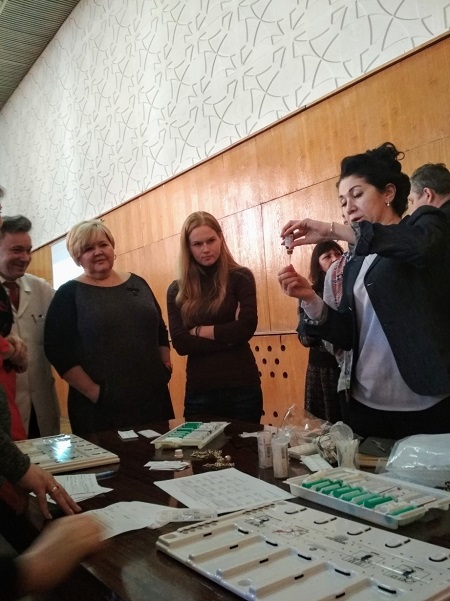Department of Clinical Immunology and Allergology with Medical Genetics Section
News of department
THE DEPARTMENT OF CLINICAL AND LABORATORY IMMUNOLOGY, ALLERGOLOGY AND MEDICAL GENETICS TAKES AN ACTIVE PARTICIPATION IN THE DEVELOPMENT AND IMPLEMENTATION OF A NEW DIRECTION IN CLINICAL PRACTICE – IMMUNOTOXICOLOGY.
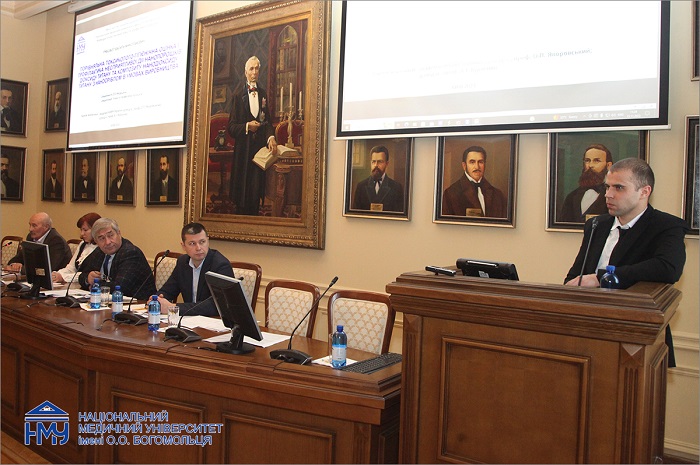
On October 15, another young scientistVasyl Ryabovol of the O.O. of Bogomolets National Medical University successfully defended his dissertation on the topic “Comparative toxicological and hygienic assessment and prevention of adverse effects of titanium dioxide nanopowders and nanotitanium dioxide composite with nanosilver in production conditions”, which is quite relevant scientific research. After all, the use of nanomaterials is rapidly being implemented in various fields of economic activity, including medicine.
The meeting of the specialized academic council on the defense of this dissertation in the field of knowledge 22 “Health care” in the specialty 222 “Medicine” was held in a mixed format under the chairmanship of the director of the Institute of Hygiene and Ecology of NMU, Professor Serhii Omelchuk.
Reviewers and opponents noted the scientific novelty and practical significance of the dissertation, which is devoted to the prevention of adverse effects of nanopowders of titanium dioxide and nanocomposite of titanium dioxide with silver on the health of the operators of their synthesis. The toxic effect of metal nanoparticles is associate with their nanosize and high surface activity, which allows them to penetrate into cells and interact with biological structures. This can lead to the creation of reactive oxygen species, causing oxidative stress, DNA damage, destruction of cell membranes, organ and tissue dysfunction, inflammation and immunotoxicity, as well as the development of long-term consequences such as cancer, neurotoxicity, reproductive disorders.
The results of Vasyl Ryabovol’s research work make it possible to scientifically justify and implement a number of health measures. On the basis of hygienic and experimental studies, he developed preventive recommendations for preventing the adverse effects of nanopowders on the human body.
The scientific supervisors of the dissertation, the head of the Department of Hygiene, Occupational Safety and Occupational Health of NMU, Professor Oleksandr Yavorovsky and the head of the Department of Clinical and Laboratory Immunology, Allergology and Medical Genetics of our University, Professor Andriy Kurchenko noted that the average lethal dose from exposure to nanopowders was determined for the first time. histological methods established the features of the manifestations of pathological changes in the structural organization of tissues, which were recorded during research on laboratory animals.
The specialized academic council decided to award Vasyl Ryabovola with the scientific degree of Doctor of Philosophy.
We sincerely congratulate the young scientist and his scientific supervisors on a successful result!
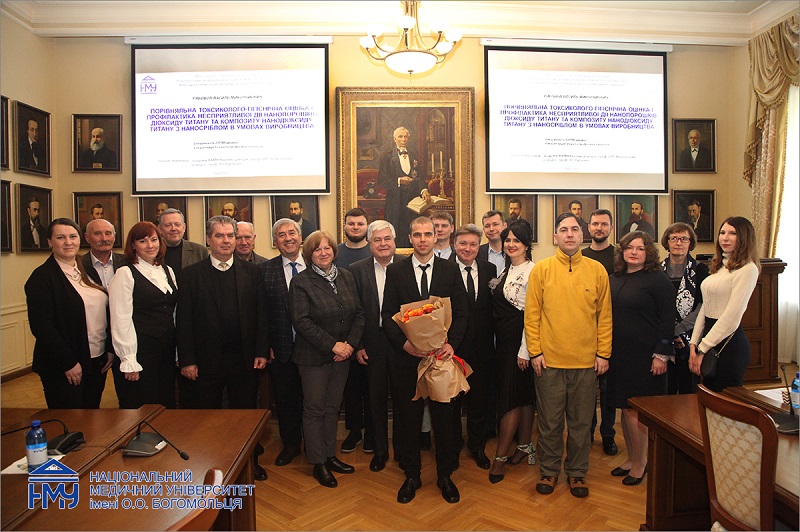

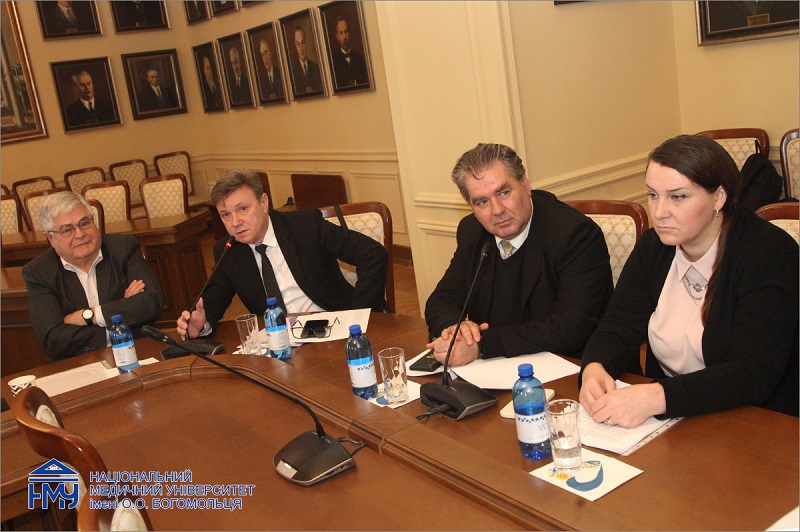
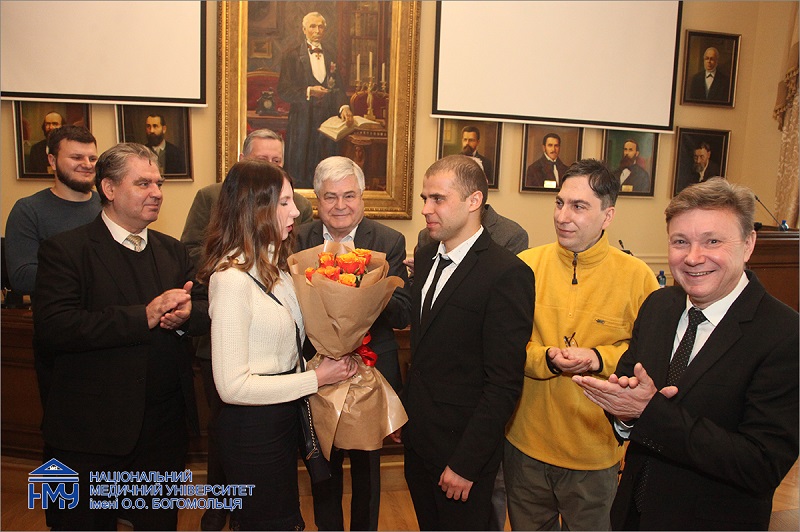
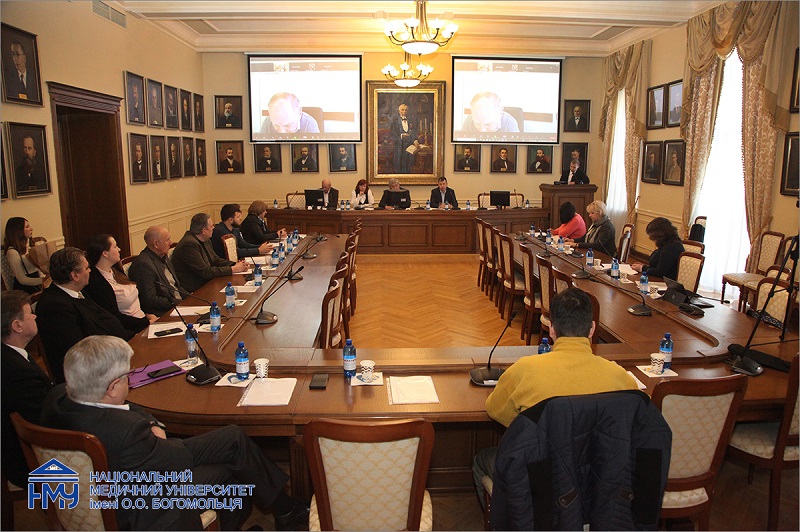
THE 1ST EDITION OF DOCTORS OF THE THEMATIC IMPROVEMENT COURSES “ALLERGIC SKIN DISEASES” AT THE DEPARTMENT OF CLINICAL AND LABORATORY IMMUNOLOGY, ALLERGOLOGY AND MEDICAL GENETICS
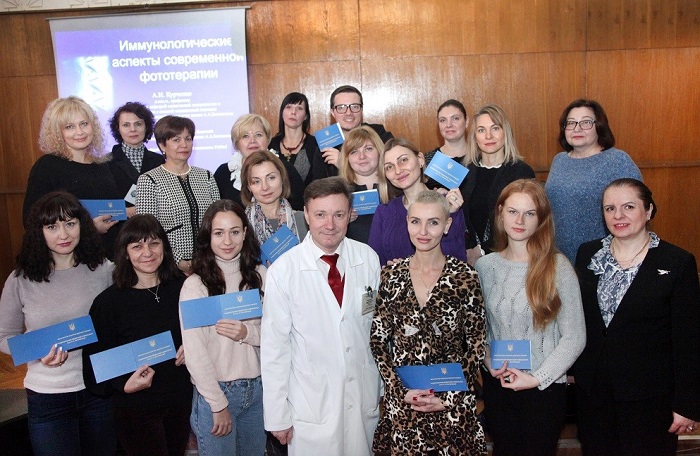
From December 16, 2019, the first course of thematic improvement “Diagnosis and treatment of allergic skin diseases (atopic dermatitis, contact dermatitis, chronic urticaria, angioedema)” was started at the Department of Clinical and Laboratory Immunology, Allergology and Medical Genetics. 14 participants of various specialties (pediatricians, dermatologists, family doctors, allergists-pulmonologists) worked during the week, acquiring new modern knowledge and improving practical skills.
The course was held at the main base of the Department of Clinical and Laboratory Immunology, Allergology and Medical Genetics on the street. Voloska, 47.
The main issues that were illuminated during the course were modern views on the immune mechanisms of the development of allergic diseases in general, and allergic skin diseases in particular. Great attention was paid to new, modern standards of diagnosis and therapy, taking into account the latest achievements of fundamental immunology and allergology.
Head of the department, Doctor of Medicine, Professor Kurchenko A.I. presented a thorough lecture: “Modern clinical immunology and allergology in practice”, which contained basic knowledge about the new achievements of fundamental immunology and allergology, which are embodied in the creation of new diagnostic methods and the development of fundamentally new approaches to the treatment of immune-dependent diseases, including allergic. The lecture aroused great interest, there was a discussion of the newest methods of diagnosis (such as conducting molecular allergy diagnostics using microchips (ALEX technology), which quickly entered the routine practice of doctors and the newest biological immunopreparations belonging to monoclonal antibodies and widely used in the treatment of immune-dependent diseases).
Doctor of Medcine, associate professor D.V. Plahotna held a lecture and a practical session with doctors on the topic “Atopic dermatitis in children”, where the issues of genetic markers, environmental influences, the latest views on the immune mechanisms of the development of atopy and pseudoallergy in children, as well as modern methods of diagnosis and therapy, depending on mechanisms (IgE-dependent and IgE-independent atopic dermatitis). Medical histories of children with various mechanisms of development of atopic dermatitis and discussion of their further management were presented.
The next day, Doctor of Medicine, Associate Professor G.V. Fedoruk, after conducting a thorough lecture on the diagnosis and treatment of contact dermatitis, conducted a master class on the diagnosis of this disease (patch test) and demonstrated the results of previously conducted tests on patients with contact dermatitis followed by their discussion and preparation of a plan of treatment and preventive measures.
Assistant Yuriev S.D. devoted his lecture to the issues of molecular diagnosis of atopic diseases and subsequent allergen-specific therapy (ASIT), which caused considerable interest and many questions, regarding the practical aspects of the use of diagnostic tests and the use of ASIT in various situations, as a method of modern treatment of atopic diseases.
On the last day of the course, 2 very important topics were discussed. Doctor of Medicine, Prof. Kurchenko A.I. at the request of the doctors who attended the courses, he focused on the issues of modern views on the development of autoimmune pathology, including skin and hair pathologies and the latest technologies that have begun to be used in treatment. Associate Professor Fedoruk G.V. held a lecture devoted to the issue of new approaches in the diagnosis and treatment of patients with chronic spontaneous urticaria, which was also very necessary for doctors of TU courses, and after which there was a discussion of clinical cases of patients with this nosology observed by them.
Thus, in addition to the lecture course, the cadets took part in the discussion of clinical cases, consultation of patients and took part in master classes devoted to the diagnosis of allergic skin pathology.
The courses were full of informative material on issues of both fundamental and applied allergology, with which some of the cadets were introduced for the first time. Doctors received answers to their questions regarding the mechanisms of development and, accordingly, the prevention of the development of allergic skin diseases and the opportunity to more widely apply in their daily practice both modern diagnostic allergological and immunological tests (with an understanding of their informativeness) and modern methods of treatment (including h. ASIT).
This year, the thematic improvement courses “Diagnosis and treatment of allergic skin diseases (atopic dermatitis, contact dermatitis, chronic urticaria, angioedema)” are planned from October 12 to 16, as well as an eight-week course of primary specialization in allergology from October 12 to December 4 in 2023.
